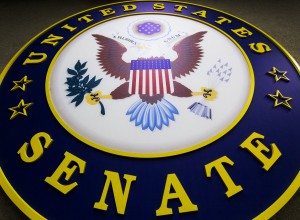 Tomorrow, the U.S. Senate Committee on Homeland Security and Governmental Affairs will hold a hearing on S. 2836, the Preventing Emerging Threats Act of 2018: Countering Malicious Drones.
Tomorrow, the U.S. Senate Committee on Homeland Security and Governmental Affairs will hold a hearing on S. 2836, the Preventing Emerging Threats Act of 2018: Countering Malicious Drones.
The proposed Act would grant the Department of Justice and the Department of Homeland Security broad powers to deal with drones that are thought to pose a security risk. The Act would allow the departments to track, take over, or take down drones. Specifically, it grants authority to:
“(A) Detect, identify, monitor, and track the unmanned aircraft system or unmanned aircraft, without prior consent, including by means of intercept or other access of a wire communication, an oral communication, or an electronic communication used to control the unmanned aircraft system or unmanned aircraft.
“(B) Warn the operator of the unmanned aircraft system or unmanned aircraft, including by passive or active, and direct or indirect physical, electronic, radio, and electromagnetic means.
“(C) Disrupt control of the unmanned aircraft system or unmanned aircraft, without prior consent, including by disabling the unmanned aircraft system or unmanned aircraft by intercepting, interfering, or causing interference with wire, oral, electronic, or radio communications used to control the unmanned aircraft system or unmanned aircraft.
“(D) Seize or exercise control of the unmanned aircraft system or unmanned aircraft.
“(E) Seize or otherwise confiscate the unmanned aircraft system or unmanned aircraft.
“(F) Use reasonable force to disable, damage, or destroy the unmanned aircraft system or unmanned aircraft.
In advance of the hearing, the Commercial Drone Alliance has released commentary; the Alliance’s member companies – a wide variety of drone industry stakeholders, including household names Ford and CNN, drone software companies and drone startups – have drafted a proposed set of Guiding Principles for Counter-UAS Legislation. The Alliance calls on lawmakers to prioritize a remote ID system and to avoid interfering with legitimate commercial operations.
The entire text of the Commercial Drone Alliance comments is reproduced below.
Guiding Principles for Counter-UAS Legislation
The safety, security, and efficiency benefits of commercial unmanned aircraft systems (“UAS”) are great and expansive, but policymaking has lagged behind technology. The Commercial Drone Alliance (“Alliance”) is committed to working with the federal government to integrate drones into our National Airspace System safely and securely.
The Alliance appreciates the common interest that the government, industry, and the general public all share in establishing reasonable limitations to protect against potential public safety and homeland security threats posed by UAS, and in that spirit, the Alliance supports an appropriately tailored measure enabling law enforcement to mitigate drone threats. However, the Alliance also believes that any counter-UAS legislation must not interfere with lawful commercial UAS operations or otherwise handicap the commercial UAS industry.
To that end, the Alliance proposes the following guiding principles for counter-UAS legislation.
Prioritize Remote Identification as Essential to Counter-UAS Efforts: The Alliance believes that establishing a comprehensive remote UAS identification and tracking system is essential to establishing reasonable controls to protect against potential safety and security threats posed by UAS, and therefore critical to the success of any counter-UAS legislation. Universal UAS remote identification and tracking is necessary to ensure that federal agencies have a means of distinguishing between cooperative (authorized) UAS and non-cooperative UAS.
Tailor Counter-UAS Legislation Narrowly: While the Alliance is generally supportive of the goals of counter-drone legislation, we believe that any legislation must be appropriately tailored. It should enable law enforcement to mitigate or confront drone threats but avoid unintended consequences that may restrict innovation, adversely affect authorized commercial drone flights, threaten privacy, civil rights, or civil liberties, or otherwise cause harm.
Avoid Interference With Authorized Commercial UAS Operations: Counter-UAS legislation must include procedural safeguards to ensure that any mitigating actions are both justified and proportionate to the perceived threat. Any legislation should require that the relevant agencies use reasonable care not to interfere with non-targeted manned or unmanned aircraft, communications, equipment, facilities or services. Whenever possible, federal agencies should be required to make reasonable efforts to provide notice to a UAS operator before taking action.
Incorporate Data and Privacy Protections: While it is critical that law enforcement has access to data when necessary, it is also critical that this authority remains appropriately tailored and, in line with general privacy and legal principles and constitutional protections, available to officials only on an as-needed basis. Commercial UAS store a large variety of confidential business information, which may include trade secrets. Additionally, UAS are commonly operated by multi-purpose devices such as smart phones and laptops, which often store data unrelated to the operation of the UAS. Counter-UAS legislation must include appropriate safeguards to protect and prohibit access to such data.
Work with Industry to Develop a Trusted Operator System: Trusted operator or user programs such as the Transportation Security Administration’s Pre-Check and Global Entry programs have supported the government’s ability to identify legitimate threats while promoting public trust and improving efficiency. A similar “trusted operator” system would enable the government to maintain a database of authorized commercial UAS operations, which would help the relevant agencies and public safety officials with threat discrimination.

Miriam McNabb is the Editor-in-Chief of DRONELIFE and CEO of JobForDrones, a professional drone services marketplace, and a fascinated observer of the emerging drone industry and the regulatory environment for drones. Miriam has penned over 3,000 articles focused on the commercial drone space and is an international speaker and recognized figure in the industry. Miriam has a degree from the University of Chicago and over 20 years of experience in high tech sales and marketing for new technologies.
For drone industry consulting or writing, Email Miriam.
TWITTER:@spaldingbarker
Subscribe to DroneLife here.







[…] the view of the ACLU, who opposes the bill, and some drone advocacy groups, who caution that too broad an interpretation of the proposed law could cause problems for […]